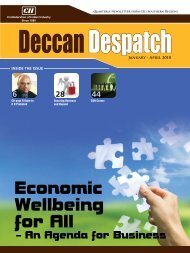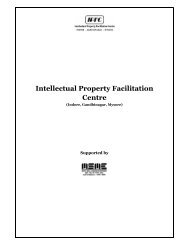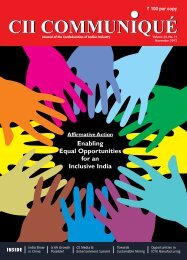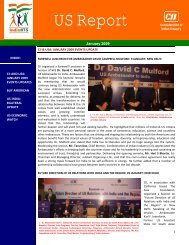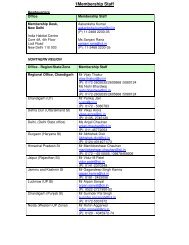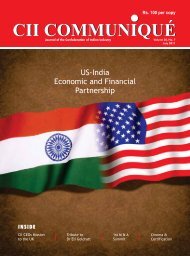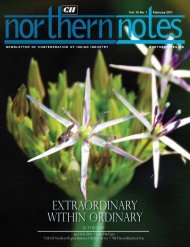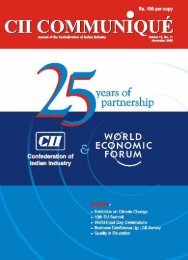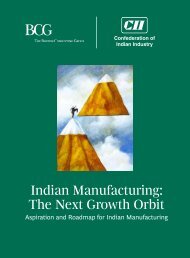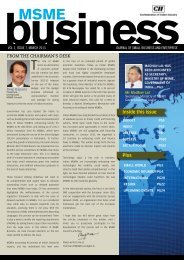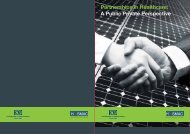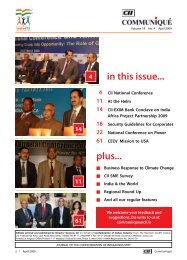CII Communique - February, 2010
CII Communique - February, 2010
CII Communique - February, 2010
Create successful ePaper yourself
Turn your PDF publications into a flip-book with our unique Google optimized e-Paper software.
eport<br />
activity has continued on a recovering trend, which is<br />
expected to be maintained.<br />
IT Sector Posts Surplus<br />
The national trade balance in South Korea’s IT sector<br />
posted a $58.97 billion surplus, the second highest IT<br />
trade surplus in Korea's history.<br />
FDI<br />
FDI in Korea fell 1.9% year on year to $11.48 billion<br />
in 2009. The manufacturing sector saw a growth of<br />
23.9%, while FDI in the service sector dropped 9.5% to<br />
$7.59 billion, mainly due to declining investment in the<br />
finance and insurance sector. Greenfield investments<br />
saw an increase of 11.4%, but FDI through mergers and<br />
acquisitions slid 23.8%. While large-scale investments<br />
in excess of $100 million posted an increase of 32.8<br />
percent from 2008, new investments fell 9.1% compared<br />
with 2008 levels.<br />
Investment in Tech Research<br />
South Korea plans to invest billions of won in research<br />
to develop competitive home-grown technology. The<br />
Ministry of Education, Science and Technology will<br />
spend 354.9 billion won (US$316.0 million) this year - an<br />
South East Asia<br />
Australia<br />
The Performance of the Manufacturing Index by the<br />
Australian Industry Group and PricewaterhouseCoopers<br />
increased by 2.5 points to 51 in January <strong>2010</strong>, just<br />
above the 50 point level which indicates expansion.<br />
There was renewed demand in the housing and<br />
resources sectors, especially for businesses involved<br />
in construction materials, transport equipment, petrol<br />
and coal products.<br />
However, Ms Heather Ridout, Chief Executive, Australian<br />
Industry Group, said there were still some areas of<br />
weakness, with employment falling for the first time<br />
in three months. The largest falls in employment<br />
within the manufacturing sector were in food and<br />
beverages, textiles, clothing and footwear. According<br />
to her, manufacturing is still a long way from recovery,<br />
with output in the sector having fallen by 7.8 per cent in<br />
the year upto September 2009, and with around 80,000<br />
jobs lost from the sector in 2009.<br />
The index also shows that while export levels were<br />
up in January, the high Australian dollar continues to<br />
restrict growth.<br />
Mr Graeme Billings, Global Head of Industrial<br />
increase of 18% over 2009 -- to expand know-how in<br />
nanotechnology, biotechnology, technology convergence<br />
and energy.<br />
Agriculture, Food Sector R&D<br />
South Korea plans to spend 5.9 trillion won (US$5 billion)<br />
on farming and food industry R&D by 2014 to build<br />
up its capabilities in this sector. The Ministry for Food,<br />
Agriculture, Forestry and Fisheries said the injection of<br />
funds starting in the new year could help push up the<br />
country's overall capabilities in the agriculture and food<br />
processing sectors to 82% of developed economies,<br />
from just 67% at present.<br />
Trade Surplus Hits Record High<br />
South Korea's trade surplus hit a record high in 2009 as<br />
exports recovered faster than expected after the global<br />
recession. The trade surplus of $40.4 billion last year<br />
was the largest ever since 1998.<br />
Per-capita GNI<br />
South Korea's per-capita GNI is expected to exceed<br />
US$20,000 this year, helped by an economic recovery<br />
and the Korean currency's strength.<br />
Manufacturing with Pricewaterhouse Coopers, said<br />
despite continued improvement in the broader economy,<br />
manufacturers are finding revenue growth a major<br />
challenge.<br />
Malaysia<br />
Dato’ Seri Mohd. Najib Tun Abdul Razak, Prime Minister<br />
of Malaysia, addressing a business meeting in New<br />
Delhi on 20 January, invited Indian companies to invest<br />
in biosciences, ICT and education, in Malaysia, and<br />
raise funds from the capital market in his country. He<br />
also proposed a year-end deadline for concluding the<br />
Malaysia-India Comprehensive Economic Cooperation<br />
Agreement (CECA). The CECA, he said, would spur<br />
additional bilateral trade and investment, as well as<br />
create jobs, investment and economic opportunities for<br />
the people of the two countries. “On our part, we will<br />
do all that is necessary to fast-track negotiations for this<br />
purpose,” Dato’ Razak declared.<br />
The Malaysian Prime Minister proposed a bilateral<br />
CEOs Forum from both countries to identify new areas<br />
of cooperation between India and Malaysia. He said<br />
that Malaysia intended to improve its visa regime to<br />
facilitate the travel of business persons and tourists to<br />
56 | <strong>February</strong> <strong>2010</strong> Communiqué



